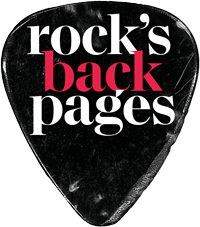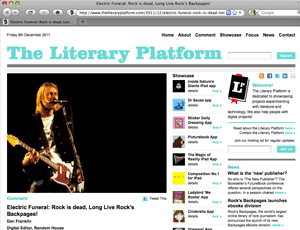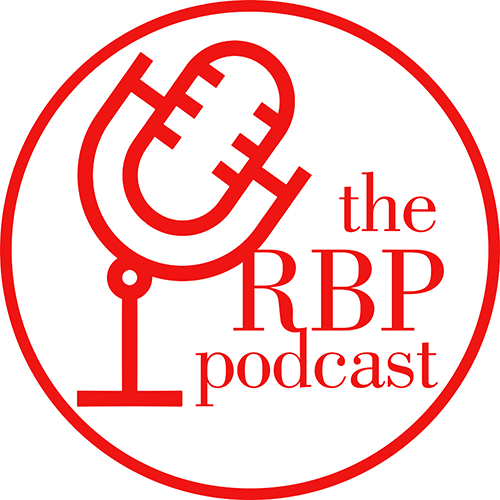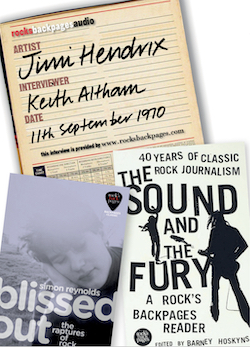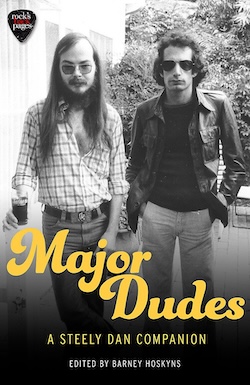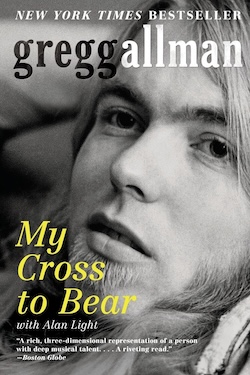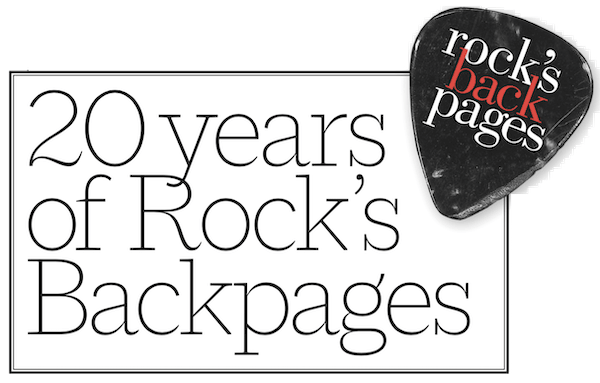The Literary Platform
Electric Funeral: Rock is dead, Long Live Rock’s Backpages!
Dan Franklin, Digital Editor, Random House
December 7th, 2011
At an event at Rough Trade East in London a couple of weeks ago, Nicky Wire (bassist with The Manic Street Preachers), stressed the importance of mythologizing rock music, whether this is undertaken by bands themselves or their critics.
Rock’s Backpages – as an online repository of rock journalism – is a readily accessible treasure trove of mythmaking. Collecting journalism from the archives of numerous publications and rock journalists it represents the high watermark of music journalism, one which the tide has greatly receded from in recent years.
Many of the writers brought together in this batch of Rock’s Backpages ebooks (split into two categories: Anthologies and Classics) remain authoritative and still active practitioners. The triumvirate of Jon Savage, Simon Reynolds and Barney Hoskyns – like that famous novelistic trio of Ian McEwan, Martin Amis and Julian Barnes – remain the pre-eminent rock writers and their new books are immediately regarded as canonical.
Why they haven’t been supplanted is explained by the changes that have wracked the music industry itself. As for musicians and the outlets for their work, the musical commentariat has been unanchored and set adrift online, no longer tethered to the three revolutionary ‘inkies’ which reached a creative peak in the late seventies that continued into the eighties: NME, Melody Maker and Sounds. Only the NME remains, a culturally bankrupt shadow of its former self.
The mythology of the last ten years for the music industry is one of apocalypse, doomed like Prometheus to have its liver torn out day after day, caught in a diminishing circle of repetition and pastiche. The ‘democratization’ of the web is largely to blame. It enabled Napster –the great Satan – to emerge and in its smashing of conventional business models and its enabling of endless access to the artefacts of our cultural past (to paraphrase Simon Reynolds’ superb introduction to his last book Retromania), rock music has been rendered artistically inert, whereas electronic music has thrived in an environment where the remix and mash-up thrive. And with it, the quality of music writing has suffered, infected by a blog pandemic.
This isn’t to say good music writing doesn’t exist online – The Quietus is a model of moving the ideals of the old onto new platforms – and it’s timely that as the book publishing industry grapples with the transition to digital that RBP’s content has been re-packaged and made available as ebooks.
What are we to make of the fact that three of the titles on the Classics list were previously published by traditional book publishers? Bud Scoppa’s book on The Byrds by Scholastic Magazine in 1971, Blissed Out by Simon Reynolds originally by Serpent’s Tail and Hoskyns’s Glam! was issued in 1998 by his still current publisher Faber and Faber (what does it also say that the music book I am most anticipating next year is his book on Led Zeppelin, a band gone for the best part of 30 years?).
In the Anthologies category, alongside a compendium of writing about Bob Dylan (speaking of artistically inert…) is The Nirvana Electric Reader which is a brilliantly curated set of contemporary accounts of the band on and off-stage. Nirvana nostalgia has peaked this year on the 20th anniversary of Nevermind and the real value of this collection is the true contextualizing of the band by their contemporaries. Here is Reynolds’s review of their gig at the Kilburn National in 1991 that didn’t quite catch fire alongside his first review of Nevermind which immediately ranked them alongside punk luminaries the Sex Pistols, the Stooges and Black Flag. Opinion now is that their 1992 Reading headline set isn’t as great in retrospect as legend might have it but Michael Azzerad’s account bristles with the excitement of the band seizing their crown in the August night. I was surprised how much fresh information was contained in these old pieces (putting aside the band’s much-reported internal fractures): from the geeky (how Steve Albini mic’ed up the band to record In Utero) to the literary (did you know that Cobain based the lyrics for ‘Senseless Apprentice’ on the Patrick Süskind novel Perfume?). If Jon Savage’s pivotal ‘lost’ interview with Cobain (and the centerpiece of the collection) attests to anything it’s that the best way to get a musician to open up is to bludgeon them with a Melvins gig beforehand!
In his introduction to Blissed Out, Reynolds observes that rock writing necessarily kills what it loves by codifying it: strait-jacketing intense and emotional visceral experiences in prose. Blissed Out is clearly an early work, over-reliant on critical theory and extremely self-conscious, but as Reynolds points out in his 2011 Afterword, at least it revels in its subject matter. Now much rock writing is cautious and qualified, but the magazines these writers were paid by often gave them lots of space to let rip on their flights of fancy. If, as Elvis Costello’s famous quote goes, rock writing is ‘like dancing about architecture’, at least these guys were busting some serious moves.
I think the ebook is the perfect format to afford writers this freedom again. It’s not about what’s ‘fit for print’, it has some of the spontaneity and freedom of a blog but instead delivers a bound electric experience, unencumbered by the demands of print distribution channels. And unlike the messy experience of handling the Inkies, bytes don’t rub off on your hands.
If Glam music was the last era of great pop (as Hoskyns suggests), perhaps the ebook can be at the vanguard of indulgent, thoroughly entertaining rock writing, as music criticism is firmly established in its own Electric Period. Aside from a few niggling typos (editors and quality as ever will always have their place), these ebooks convey (yet again) that we should adopt a thoughtful and curated approach to great writing online. As to whether the emerging school of writers have anything decent to write about, I’m afraid the internet is at least partially to blame.
Dan Franklin is Digital Editor at Random House UK
back to Press Room


